|
Ford Focus (America)
Debut: 2005
Maker: Ford
Predecessor: Focus (1998)
|
|
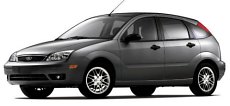 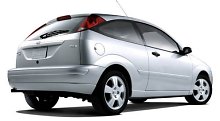 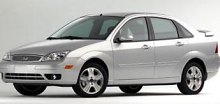
The
first generation Ford Focus was a "World Car". Originally designed and
engineered in Europe, it was also modified for the North American
market,
manufactured there and on sale there. It is the first car winning
European
Car of the Year award and North American Car of the Year award
simultaneously.
Being cheap, spacious and fun to drive, it is popular in the USA
market.
However,
the
European Focus
and American Focus split in late 2004 when the second generation Focus
arrived Europe. The new Focus is considered to be too expensive for the
US market, where Focus was the company’s entry-level model. So Detroit
would rather stick with the old Focus.
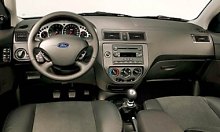 Instead
of renewing it, Detroit gave the old Focus a "facelift" and a revamped
interior. While the changes inside and out might not look better than
the
old car, the new engines are certainly better. As the old Zetec engines
stopped producing, they are replaced with Mazda’s MZR engines. The base
2.0-litre 16V produces 136hp, six horses up from the old engine. Instead
of renewing it, Detroit gave the old Focus a "facelift" and a revamped
interior. While the changes inside and out might not look better than
the
old car, the new engines are certainly better. As the old Zetec engines
stopped producing, they are replaced with Mazda’s MZR engines. The base
2.0-litre 16V produces 136hp, six horses up from the old engine.
Unfortunately,
the exciting
and bargain SVT Focus (equivalent to Europe’s ST170) was dead,
substituted
by a cheaper, slower and less exciting ZX4 ST. This car is in sedan
form
only (the ugliest form of Focus). Powered by Mazda’s 2.3-litre 16V
engine
which produces 151 horsepower and runs a 5-speed-only gearbox. No match
with the 170hp, 6-speed SVT.
The
American
Focus is available
in 4 body styles - sedan (ZX4), 3-door hatch (ZX3), 5-door hatch (ZX5)
and station wagon. The hatches are the most loyal to the original
design
of European Focus, thus they are also the most beautiful. The sedan is
the ugliest because it is not compatible with the original design of
Focus,
which was conceived as a hatchback only.
To please the
American customer’s
taste, the American Focus gets softer suspension setup and lighter
steering
than the original European Focus. Despite that, its Control-Blade
suspensions
and nice steering feel still deliver more driving fun than Toyota
Corolla
and Honda Civic. Nevertheless, after 6 years, it shows its age in
quality
and refinement compared with its Japanese rivals. In the foreseeable
future,
low price will be a key to its survival. |
| The
above report was last updated on 24 Jan
2005. All Rights Reserved. |
Focus facelift 2007
|
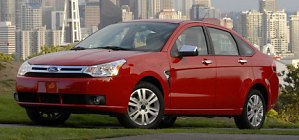 Poor American Focus is nearly 10 years
old. What birthday present could be better than a new clothes ? Give it
a pair of new headlamps and a chromed bar grille like its bigger
brother Fusion, it looks almost like a new car… as long as you look
from the front. Turn your vision to the side and you'll see it is still
very much the old car in profile. People do facelift because it is the
cheapest way to make things look new. Unfortunately, when you have a
limited budget, you cannot alter the hard points, so the general
profile remains unchanged. My experience tell me most facelifts
actually ruin the original designs, because new elements are often
incompatible with old ones. In the facelifted Focus, you can see its
new front end design doesn't gel with the old body. Never mind, at
least it looks better than the 2004 facelift. Poor American Focus is nearly 10 years
old. What birthday present could be better than a new clothes ? Give it
a pair of new headlamps and a chromed bar grille like its bigger
brother Fusion, it looks almost like a new car… as long as you look
from the front. Turn your vision to the side and you'll see it is still
very much the old car in profile. People do facelift because it is the
cheapest way to make things look new. Unfortunately, when you have a
limited budget, you cannot alter the hard points, so the general
profile remains unchanged. My experience tell me most facelifts
actually ruin the original designs, because new elements are often
incompatible with old ones. In the facelifted Focus, you can see its
new front end design doesn't gel with the old body. Never mind, at
least it looks better than the 2004 facelift.
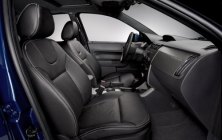 More successful is the new cabin, which gets a new
dashboard and new seats. It still employs hard and shinny plastics, but
the aluminum effect trim looks pretty good and there are some new
gadgets to lift the ambience – what about a Toyota bB-style illuminated
cup holder ? Or Microsoft's Sync infotainment control system ? The
latter can connect your MP3 player and mobile phone with USB or
Bluetooth and operate them via voice recognition. The new seats are
equally impressive for comfort and support. What the cabin begs for is
more rear passenger space to fight against newer rivals. More successful is the new cabin, which gets a new
dashboard and new seats. It still employs hard and shinny plastics, but
the aluminum effect trim looks pretty good and there are some new
gadgets to lift the ambience – what about a Toyota bB-style illuminated
cup holder ? Or Microsoft's Sync infotainment control system ? The
latter can connect your MP3 player and mobile phone with USB or
Bluetooth and operate them via voice recognition. The new seats are
equally impressive for comfort and support. What the cabin begs for is
more rear passenger space to fight against newer rivals.
Mechanically, the biggest change is the deletion of 3 and 5-door
hatchback body, leaving only the fastest selling 4-door sedan and the
new 2-door coupe, which doesn't look as sleek as a coupe ought to be.
To simplify production further, the previous 2.3-liter engine has been
ditched, leaving only the 2.0-liter Duratec. Ford improved its intake
and cooling so that it produces slightly more power at 140 hp. This
engine is generally refined and gusty, providing decent performance.
Both 5-speed manual and 4-speed automatic transmission shift smoothly.
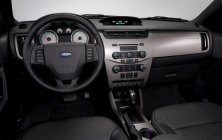 The chassis has been strengthened a little bit thanks to a
stronger cross member running under the dashboard. NVH suppression is a
major concern: it uses denser sound deadening foams, better sealing and
thicker glass to insulate the cabin from noise sources. As a result,
the new Focus delivers impressive refinement - engine, road and wind
noise have been largely reduced such that it feels more refined than
most Japanese rivals. This is definitely the most improved area of the
new Focus. Similarly, the retuned suspension delivers a supple ride
which may shame many rivals. At the same time, handling and steering
remains excellent. If you could ignore its uninspiring look, this old
soldier could be a better companion than Mazda 3. The chassis has been strengthened a little bit thanks to a
stronger cross member running under the dashboard. NVH suppression is a
major concern: it uses denser sound deadening foams, better sealing and
thicker glass to insulate the cabin from noise sources. As a result,
the new Focus delivers impressive refinement - engine, road and wind
noise have been largely reduced such that it feels more refined than
most Japanese rivals. This is definitely the most improved area of the
new Focus. Similarly, the retuned suspension delivers a supple ride
which may shame many rivals. At the same time, handling and steering
remains excellent. If you could ignore its uninspiring look, this old
soldier could be a better companion than Mazda 3.
Unfortunately, most people care too much about looks and age. No matter
how good it drives, the new Focus will not be admired by many people.
Sooner or later Ford must bring a really fresh small car to the US
market. Let's hope it to be Focus Mk3 or the next generation Fiesta /
Verve. It can't afford to lose any more business to the Japanese and
Korean. |
| The
above report was last updated on 5 Oct 2007. All
Rights Reserved. |
|
|